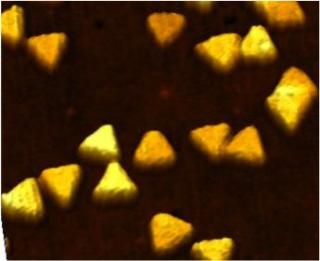Gold nanoprisms have been used to develop a sensor that can be used to diagnose pancreatic cancer. The gold nanoprisms interact with microRNA in the patients blood to indicate if the disease is present. This novel technology is both cheap and effective.
 Credit:Department of Chemistry and Chemical Biology, School of Science, Indiana University-Purdue University Indianapolis
Credit:Department of Chemistry and Chemical Biology, School of Science, Indiana University-Purdue University Indianapolis
The IUPUI team has elucidated the design, development and testing of the new microRNA sensor in a study reported in American Chemical Society’s peer-reviewed journal, ACS Nano, which is dedicated to studies related to nanotechnology and nanoscience. Based on the potential test results, the researchers reported that the novel sensor can easily detect pancreatic cancer, or can determine the level of changes in microRNA signatures related to cancer to specify the presence of a benign state.
A team from Indiana University-Purdue University Indianapolis (IUPUI) designed, developed and tested the new sensor which detects microRNAs (mRNAs) in patients bodily fluids. Based on the results of their research the team are confident that the novel sensor can determine changes in mRNA signitures that will allow the easy detection of pancreatic cancer or to identify a benign state.
mRNAs are tiny RNA molecules which control and regulate the degree by which larger RNA molecules influence protein expression. Due to the crucial role they play in protein expression microRNAs are key biomarkers (molecules that are indictive of a diseased patient) in disease studies.
Recent research has shown that microRNAs themselves contribute towards cancer, cardiovascular disorders, diabetes and other related diseases.
The groundbreaking sensor developed by the IUPUI researchers is capable of sensing changes in microRNA. The device takes the form of a tiny glass chip which includes gold nanoprisms; pyramid shaped gold nanoparticles. When the sensor is immersed in a sample of body fluid such as blood, the nanoprisms optical properites are changed. This change in optical behaviour can be detected spectroscopically to detect the amount of 'interesting' microRNAs in the patient.
We used the fundamental concepts of nanotechnology to design the sensor to detect and quantify biomolecules at very low concentrations. We have designed an ultrasensitive technique so that we can see minute changes in microRNA concentrations in a patient's blood and confirm the presence of pancreatic cancer.
Prof. Rajesh Sardar - IUPUI
If we can establish that there is cancer in the pancreas because the sensor detects high levels of microRNA-10b or one of the other microRNAs associated with that specific cancer, we may be able to treat it sooner. He also partnered with Sardar to enhance the sensor's functions and provided a better insight into pancreatic cancer biology. Korc also headed the sensor’s testing process and its subsequent clinical applications.
This is especially significant for pancreatic cancer, because for many patients it is symptom-free for years or even a decade or more, by which time it has spread to other organs, when surgical removal is no longer possible and therapeutic options are limited. For example, diagnosis of pancreatic cancer at an early stage of the disease followed by surgical removal is associated with a 40 percent five-year survival. Diagnosis of metastatic pancreatic cancer, by contrast, is associated with life expectancy that is often only a year or less.
Murray Korc - IU School of Medicine
The use of gold nanoparticles may sound expensive, but considering their tiny size and the cost of most medical devices the new sensor is relatively economical.
$250 of gold can be used to produce 4,000 sensors, and 4,000 sensors can be used to conduct 4,000 tests at the very minimum. This low cost means the sensor can be used anywhere, including low-resource environments.
This joint study involved scientists from the schools of science and medicine from the Indiana University-Purdue University Indianapolis (IUPUI), and the Indiana University Melvin and Bren Simon Cancer Center.